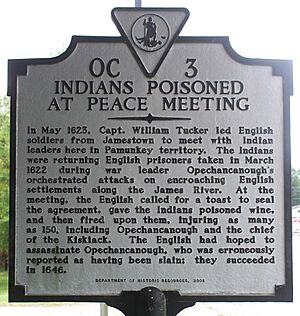John Pott facts for kids
Quick facts for kids
Doctor
John Pott
Deputy-Governor and Physician-General
|
|
|---|---|

The 1623 wine incident that involved Pott and William Tucker
|
|
| Died | after March 25, 1651 |
| Other names | John Potts |
| Occupation | physician |
| Spouse(s) | Elizabeth |
| Preceded by | John Harvey |
| Succeeded by | John West |
| Virginia Governor's Council | |
| In office 1625–1629 |
|
| 5º Crown Governors Virginia | |
| In office 1629–1630 |
|
John Pott (also known as John Potts) was an important doctor and leader in the early Virginia Colony. He lived in the 1600s at the Jamestown settlement. He even served as the Colonial Governor of Virginia for a short time.
Contents
Life and Times of John Pott
Becoming a Doctor
John Potts likely studied at Oxford University in England. He earned his Master of Arts (M.A.) degree there in 1605. This education prepared him for his future role as a physician.
Journey to Virginia
A respected doctor named Theodore Gulston suggested John Potts for the job of physician for the Virginia Company of London. This company helped set up the colony. In 1621, the company noted that Mr. Potts was "well practised in Chirurgerie and Physique." This means he was skilled in both surgery and medicine.
Dr. Potts and his wife, Elizabeth, traveled from London to Virginia. They sailed on a ship called the George in March 1619. After about two months, they arrived in Jamestown in May 1619.
Challenges and Leadership
In 1623, Dr. Potts was involved in a difficult event. This happened after a major conflict between the colonists and Native Americans. About a third of the colonists had been killed the year before. Dr. Potts was later cleared of any wrongdoing related to this event.
In 1625, he became a member of the Governor's Council. This council helped govern the colony. He served on the council for several years. In 1628, he was chosen to be the Governor of Virginia. He held this important position from 1629 to early 1630.
Later, he faced accusations and was replaced as governor by Sir John Harvey. Despite these challenges, Dr. Pott was a very skilled physician. The colony still needed his medical help. His wife, Elizabeth, even traveled back to England to speak on his behalf. Governor Harvey eventually asked the king to pardon Dr. Pott. He said Dr. Pott was "by far the best physician in the colony." Dr. Pott was pardoned and continued his medical work.
Building a Home and Community
Dr. Potts owned a large farm, which was called a plantation. He named it "Harrop." This name might have come from his family's home area in Cheshire, England. In 1631, he officially received the land for this plantation.
In 1632, Dr. Potts received another large piece of land. This land was about 1,200 acres (4.9 square kilometers). It was located near Archer's Hope Creek. This area was important for building a fortified wall across the peninsula.
In 1633, the General Assembly decided to build a new settlement. This settlement was called Middle Plantation. It was located on a high ridge between two creeks. This spot was chosen because it had good drainage, which meant fewer mosquitoes. It was also easy to defend. The main road down the peninsula went through this area. Years later, Middle Plantation was renamed Williamsburg in 1699.
Family Life
Dr. Potts is thought to have had no children. He likely passed away before 1651.
 | Roy Wilkins |
 | John Lewis |
 | Linda Carol Brown |

